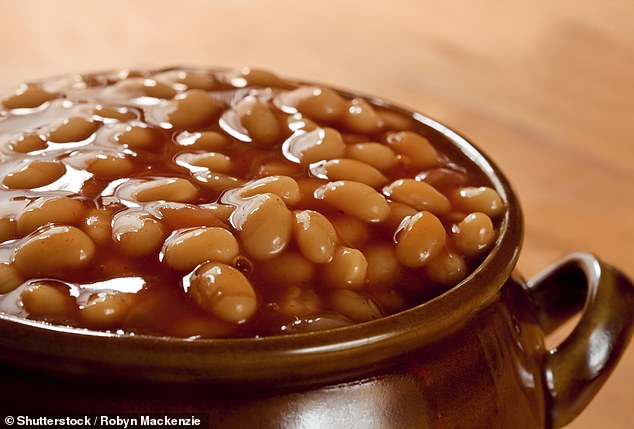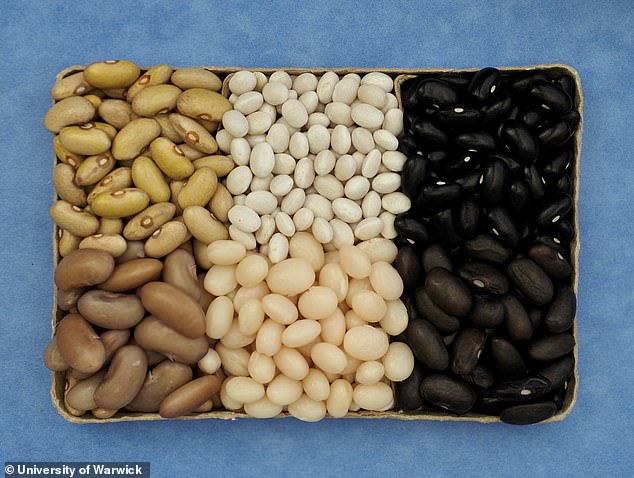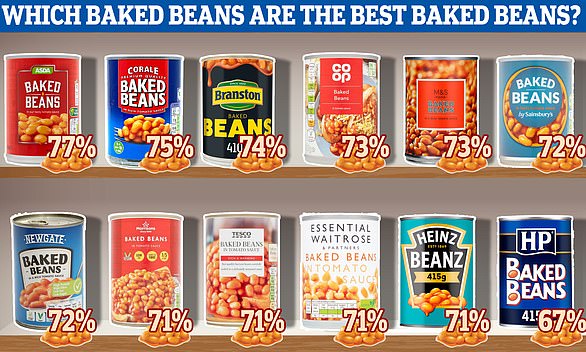A step closer to British Baked Beans on the breakfast menu! The first haricot beans grown in the UK are canned
>
- The first ever commercial crop of British baked beans has been canned
- Scientists have spent 12 years developing a bean capable of adapting to our cold climate
They have long been a national mealtime staple.
But the glorious British weather has made growing baked beans ourselves an agricultural fantasy – until now.
The first ever commercial crop of British baked beans has been canned, after university students spent 12 years developing a bean capable of adapting to our cold, wet climate.
The specially modified beans were harvested in September on a farm in Leadenham, Lincolnshire.
It is hoped that breeding a UK-specific variety of common dry bean will usher in a new pulse market for UK farmers, with the aim of reducing food imports.
The first ever commercial crop of British baked beans has been canned, after university students spent 12 years developing beans capable of adapting to our cold, wet climate.

History: Traditionally, baked beans are mostly sourced from overseas markets in the United States, Canada, Ethiopia, and China due to the specific climate and soil requirements needed for their successful cultivation.
More than two million tins of beans are eaten in Britain every day, and all the beans are grown in the US, Canada, Ethiopia and China.
The breakthrough came after scientists at the University of Warwick relaunched work that began under the Department of Agriculture, Fisheries and Food in the 1980s. They evaluated strains from previous bean breeding work and selected a distinctive and stable variety of small white beans.
A smaller-scale trial to grow the new, early-maturing variety – called Capulet after one of the warring families in Shakespeare’s Romeo and Juliet – failed in 2022 due to a summer heatwave.
But a new field trial this year was successfully harvested by farmer Andrew Ward, who then watched as some were canned at the Princess Cannery in nearby Spalding. Most of the grain harvested will be used to grow another crop next year.
Mr Ward hailed the achievement as a “milestone”.
“As a nation, we import a lot of food,” he said.
“To be able to produce something that we consume in such large quantities in this country is incredible.” He added: “We suffered in the past with the varieties that were available to us, and those varieties came from other countries whose climate is different from our climate.”
‘There were attempts to grow British beans that did not mature and did not mature, and after a few years the University of Warwick began to deal with these beans and find out why they did not work and what to do.’
Further trials will now be carried out, but Professor Eric Holub, a plant genetics expert from the university’s School of Life Sciences, said the aim was to introduce catabolite beans into UK production for UK farmers.

The new variety of baked beans was named Capulet (middle and upper uncooked and lower cooked). Scientists also grew two other types of beans, Godiva (left) and Olivia (right).

The team behind the beans: Farmer Andrew Ward (pictured left) grows legumes in a 13-acre field in Leadenham. Professor Eric Holub (right), from the University of Warwick, said the beans were produced from “traditional plant breeding”.
The beans were harvested on September 28 – almost a month before traditional crops are ready for harvest, when storms and heavy rain tend to become fixtures of British weather.
The Princes produce 264 million cans of beans each year for Branston Foods and supermarket brands.
The company’s David McDiarmid said they were “very proud” to have secured the first supply of British-grown beans.
“There is a lot of work being done in the food industry in terms of alternative sourcing, especially with a focus on achieving greater self-sufficiency for the UK, or the environmental angle,” he said.
(Tags for translation)dailymail

